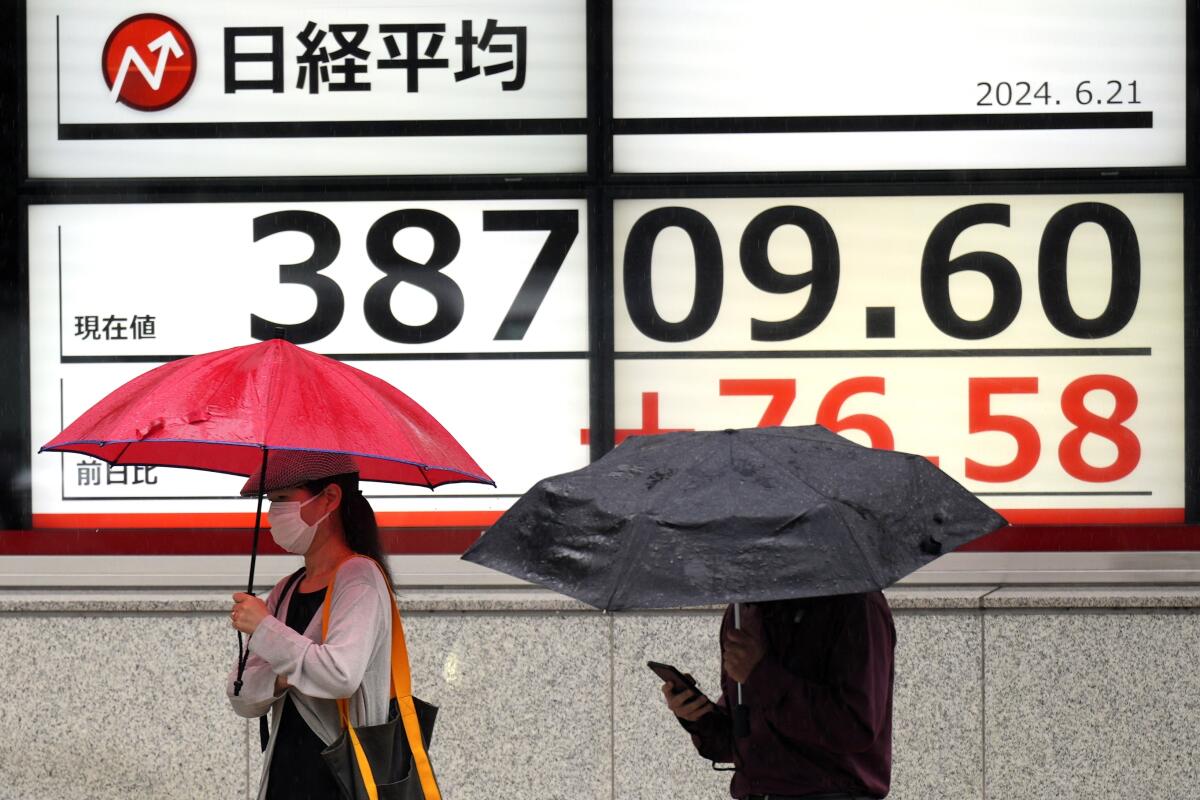A dip for Nvidia weighs on Wall Street; stock indexes edge back from records

- Share via
TOKYO — U.S. stock indexes edged back from their records Thursday, weighed down by a dip for Wall Street darling Nvidia after a mixed set of reports on the economy.
The Standard & Poor’s 500 dropped 0.3% from its all-time high set before trading paused for Wednesday’s Juneteenth holiday. The Nasdaq composite also pulled back from its record and slipped 0.8%. The Dow Jones industrial average beat the market with a gain of 299 points, or 0.8%.
Nvidia gave up an early gain and swung to a loss of 3.5% to put at risk an eight-week winning streak. The chip company has been the main beneficiary of Wall Street’s frenzy around artificial intelligence technology, and it had supplanted Microsoft on Tuesday to become the most valuable company in the market. Nvidia’s stumble ceded the top spot back to Microsoft.
Nvidia’s chips are helping to power the move into AI, which proponents see producing explosive growth in productivity and profits, and it’s already up 164% this year after more than tripling last year.
Besides raising worries about a potential bubble in which investors’ excitement is getting excessive, the eye-popping gains for Nvidia and other AI winners have also helped prop up the stock market despite some weakness in the U.S. economy. High interest rates meant to grind down inflation have hurt the housing market and manufacturing, while lower-income households are showing signs of struggling to keep up with still-rising prices.
Winnebago Industries, for example, has been introducing “economical” trailers to attract customers amid “inconsistent retail patterns.” But it said Thursday its profit and revenue for the latest quarter fell short of analysts’ expectations. Shares of the maker of motor homes and pontoons fell 3.5%.
In a show of how powerful AI can be, Accenture rose 7.3% even though the consulting and professional services company reported weaker profit and revenue for the latest quarter than expected. In its earnings report, it highlighted how it won more than $900 million in new bookings for generative AI to bring the total for its last three quarters to $2 billion.
All told, the S&P 500 fell 13.86 points to 5,473.17. The Dow rose 299.90 points to 39,134.76, and the Nasdaq fell 140.64 points to 17,721.59.
The supernova for AI stocks has helped mask some weakness underneath the surface in the market. That can be a worrying signal for market watchers, who would prefer to see a large number of companies pushing the market higher instead of just a handful.
“It has been common in past cycles, as the stock market is coming into a meaningful top, that the biggest growth names are the ones carrying the load,” according to Scott Wren, senior global market strategist at Wells Fargo Investment Institute.
In the bond market, Treasury yields ticked higher after a spate of mixed reports on the economy. The number of U.S. workers filing for unemployment benefits eased last week, but not by as much as economists expected. A separate report said manufacturing in the mid-Atlantic is growing, but not as quickly as economists thought. Home builders, meanwhile, broke ground on fewer new homes last month than expected.
The hope on Wall Street is actually for a slowdown in the U.S. economy’s growth. That could help keep a lid on inflationary pressures and convince the Federal Reserve to cut its main interest rate later this year. Such a cut would release pressure on the economy and boost investment prices.
Fed officials have indicated they could cut their main interest rate once or twice this year, down from its highest level in more than 20 years. Many traders on Wall Street, meanwhile, are expecting two or more cuts, according to data from CME Group.
The yield on the 10-year Treasury climbed to 4.25% from 4.22% late Tuesday. The two-year yield, which more closely tracks expectations for the Fed, rose to 4.73% from 4.71%.
Some other central banks have already begun removing the brakes from their economies.
Swiss National Bank cut its main rate on Thursday. The Bank of England, though, kept its main rate steady.
Stock indexes rose across much of Europe after the moves. The French CAC 40 gained 1.3% to recoup more of its losses from last week after jolting results from elections. Asian indexes were mixed.
Choe writes for the Associated Press.
More to Read
Inside the business of entertainment
The Wide Shot brings you news, analysis and insights on everything from streaming wars to production — and what it all means for the future.
You may occasionally receive promotional content from the Los Angeles Times.










